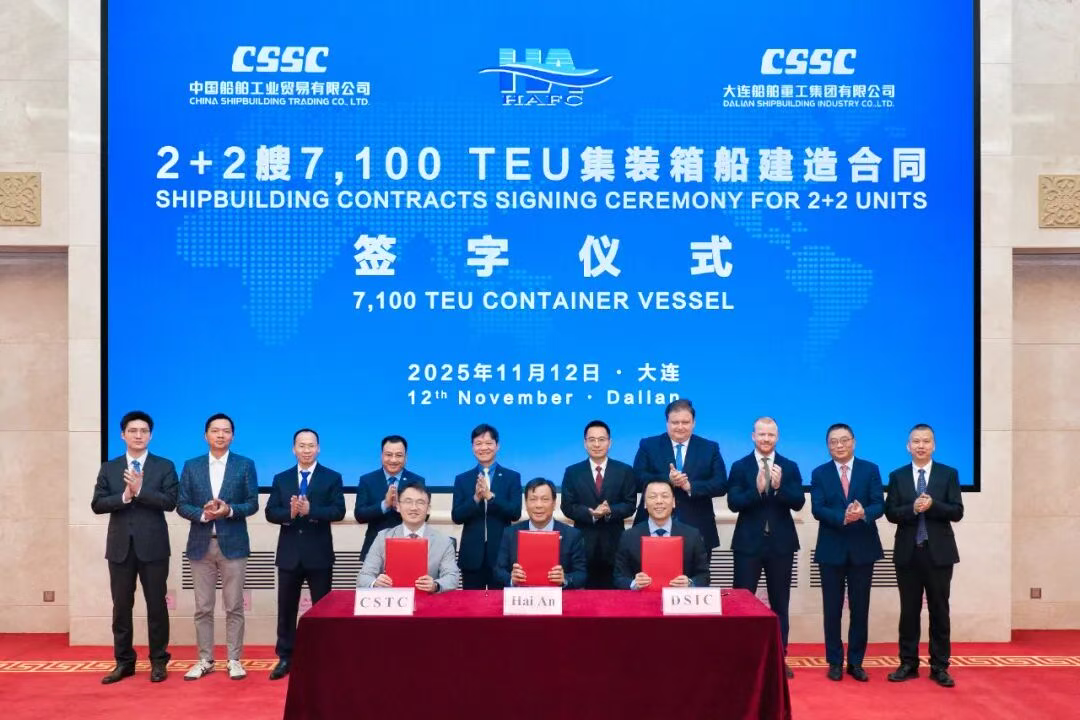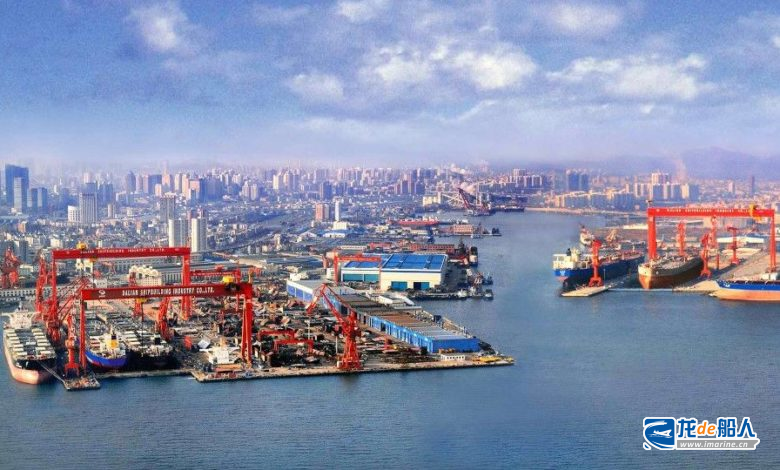Against the backdrop of the global shipbuilding industry’s green transition and supply chain restructuring, Dalian Shipbuilding Industry Corporation (DSIC), a subsidiary of China State Shipbuilding Corporation, is steadily moving towards a new stage of high-quality development, based on a solid order base, forward-looking technological roadmap, and flexible trade cooperation models.
According to an official announcement from DSIC on the 12th, the company has recently secured orders for over 30 new vessels across three core sectors: container vessels, oil tankers, and bulk carriers. The order includes 16 container vessels of two types, 10 oil tankers of three types, and four bulk carriers. By shipowner origin, 16+2 vessels are from overseas owners and 14 are from domestic owners.
With the recent signing of numerous contracts, DSIC’s order volume continues to climb, and its production capacity reserves are ample. According to the latest production schedule, DSIC’s main production lines are scheduled to operate until 2029-2030, fully demonstrating its strong competitiveness in the global market and its continued positive development trend.
16 container vessels of 2 types
Specifically, the 16 container vessels include six 7,100 TEU medium-sized container vessels and ten 22,000 TEU LNG dual-fuel ultra-large container vessels. To date, DSIC has secured orders for a total of 14 7,100 TEU medium-sized container vessels, steadily achieving efficient batch production of medium-to-large container vessels.

The six newly announced 7,100 TEU medium-sized container vessels are all ordered by overseas shipowners. On November 12, DSIC signed a 2+2 order for 7,100 TEU container vessels with Vietnam’s Hai An Lines. The other four vessels are ordered by “prominent European shipowners,” likely Greece’s Danaos Corporation and Germany’s Asiatic Lloyd, each placing an order for two vessels.
The order for 10 22,000 TEU LNG dual-fuel ultra-large container vessels also comes from a European company, further cementing DSIC’s leading position in the large clean energy vessel sector. According to previous reports, the order originates from French shipping giant CMA CGM. Earlier market rumors indicated that CMA CGM had signed a letter of intent with DSIC for 6+4 22,000 TEU LNG dual-fuel ultra-large container vessels, with the total estimated cost at the time speculated to be at least $2 billion.
It is reported that CMA CGM had been in discussions with five Asian shipyards to order 10 dual-fuel ultra-large container vessels, with a Chinese shipyard ultimately winning the bid in this round of competition.
10 tankers and 4 bulk carriers of 3 types

Ten oil tankers are all from domestic shipowners, including two 110,000 DWT product/crude tankers, two 65,000 DWT crude/product tankers, and six 307,000 DWT VLCCs. This series of orders for oil tankers continues DSIC’s traditional strengths in the product tanker, small-to-medium crude tanker, and VLCC markets, reflecting the balanced development and continuous optimization of its product portfolio.
According to previous reports, the two 110,000 DWT product/crude oil tankers and the two 65,000 DWT crude oil/product oil tankers are from Nanjing Tanker Corporation and are expected to be delivered in 2028.
Six 307,000 DWT VLCCs are being constructed by DSIC under a contract awarded to COSCO Shipping Development through Hainan COSCO Shipping Development, with a unit price of approximately RMB 850 million. The newbuilds feature a dual-fuel design with methanol and LNG fuel options. Delivery of the first vessel is scheduled to commence in April 2027, with subsequent vessels to be delivered sequentially by the end of November 2028.
Four bulk carriers with a deadweight tonnage of 210,000 tons each have been ordered by a domestic shipowner, though the delivery schedule and shipowner details remain undisclosed.
It is worth noting that all of DSIC’s new domestic shipbuilding contracts this time are paid in RMB, which not only reflects the increased bargaining power of China’s shipbuilding industry in domestic and international markets, but also sets a benchmark for the industry to promote the diversification of settlement methods and improve trade facilitation.
Currently, China’s shipbuilding industry is in a critical period of transformation and upgrading. DSIC stated that it will continue to deepen its presence in the marine equipment sector, adhere to the development direction of intelligence, greenization, and integration, continuously tackle key core technologies, improve product quality and service levels, strive to gain a more advantageous position in the global ship market competition, and make greater contributions to accelerating the construction of a manufacturing power, a quality power, and a maritime power, as well as promoting the high-quality development of the high-end equipment manufacturing industry.


